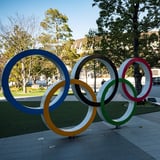
The Tokyo Olympics will take place this summer after a year-long postponement, and as vaccinations continue to roll out worldwide, there are many questions. According to a plan from the International Olympic Committee (IOC), the International Paralympic Committee (IPC), the committee in charge of organizing the Games, as well as the Tokyo and Japanese governments, participating athletes and officials will not need to be vaccinated. The IOC, however, is still encouraging countries that do wish to vaccinate their athletes ahead of the Games to lead by example.
Rules for a safe Olympic and Paralympic Games are outlined in different "Playbooks," accessed online, for groups such as members of the press, broadcasters, athletes and officials, and international federations. They were initially published in February, then subsequently updated in April and June following further evaluation of health protocols.
"Please note: While we encourage everyone coming to Tokyo to get vaccinated if this is possible in line with the national immunisation guidelines of your country, you will not be required to have received a vaccine in order to participate in the Games," the Playbook for athletes and officials states. It further says that all of the Playbook rules will apply whether or not participating people have received a vaccine.
On May 6, it was announced that Pfizer and BioNTech agreed to donate doses of their mRNA vaccine to Olympic and Paralympic Games participants, with distribution occurring in participants' home countries before they head to Japan. The Playbook for athletes and officials notes that 80 percent of Olympic and Paralympic Village residents will be vaccinated ahead of the Games this summer due to "collaboration and generous donations."
At the US Olympic and Paralympic Committee's Team USA Media Summit in April, some American athletes eyeing a spot in Tokyo spoke about getting vaccinated or having the option to do so. Simone Biles, for instance, told reporters at the time, "Once it's my time, I would love to be vaccinated. And I think it's good for athletes to become advocates for that, so we can stay safe and healthy." Rose Hollermann, from the US women's wheelchair basketball team that is already qualified for Tokyo, spoke about having easy access to vaccines thanks to the USOPC.
The rules outlined for those traveling for the Games include the basics: wear a mask at all times except for when eating, training, competing, sleeping, or outside and socially distanced from others; limit physical interactions; and practice hand hygiene. People will have to test negative for COVID-19 within 72 hours of their departure to Tokyo but take two tests total on two separate days within 96 hours of their flight to Japan. They should also expect another test upon arrival.
Athletes and those in close proximity with athletes should expect to be tested daily. All participants must also get tested upon experiencing symptoms and isolate in the event of a positive test result, as well as keep track of their health daily in designated smartphone apps. Find more COVID-19 rules and regulations at the Tokyo Games here.
To learn more about all the Olympic and Paralympic hopefuls, visit TeamUSA.org. Watch the Tokyo Olympics, beginning July 23, and the Tokyo Paralympics, beginning August 24, on NBC.

0 Commentaires